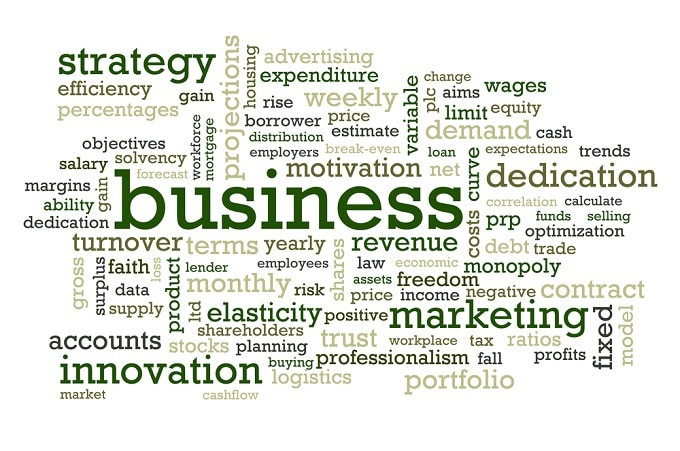No one likes to talk about the nasty things in life, right?
I mean, who enjoys discussing how many people they had to fire this week, just because the company wants to save a bit of money?
And how do you mention that you have a “poor” friend without making her sound insignificant?
Or, having said that, how do you talk about your “rich” uncle without sounding like you’re boasting?
Throughout the history of the English language, we’ve got very good at talking about the unpleasant things without mentioning them. Without being unpleasant.
Instead of saying “Hey! My aunt died!” we go for the phrase “She passed away.”
Instead of taking a look at your son’s homework and saying “Well. That’s terrible!” you have other phrases available to you, like “Well, that leaves a lot to be desired.”
Welcome to the rich world of euphemisms!
Of course saying nice things about something nasty is something that has been taken to a new level by certain institutions – usually institutions that have to do nasty things a lot of the time.
For example, we can find some interesting euphemisms from the military, like “friendly fire” (bullets and bombs that hit your own soldiers), “collateral damage” (when the soldiers kill civilians) and “clean bomb” (a bomb that kills people but keeps those nice buildings standing).
We also find a lot of euphemisms in government, like “job creators” (super rich people), “enhanced interrogation” (torture) and “alternative facts” (things that aren’t true but that you’re just going to go ahead and pretend are true because you like them).
Unsurprisingly, the business world also has a lot.
Describing status
A lot of business euphemisms describe status.
Remember your “poor” friend and your “rich” uncle?
Here’s a softer way of talking about them.
Other ways to say “rich”

- Wealthy
This is probably one that you learned in school.
- Well-to-do
Well to do what? Just “well-to-do.”
“I have a very well-to-do uncle. He collects giraffes.”
- Well-off
This is particularly common. We can use it before a noun, but we usually use it after:
“Them? Oh, they’re really well-off.”
- Comfortable
Obviously context is important.
If you just walk into a room and declare that your uncle is comfortable, then that’s not going to work.
People will be imagining his sofa.
Make sure this comes up in conversation related to status.
“Can he really afford such a ridiculously expensive habit? Oh, don’t worry about him. He’s pretty comfortable.”
Other ways to say “poor”
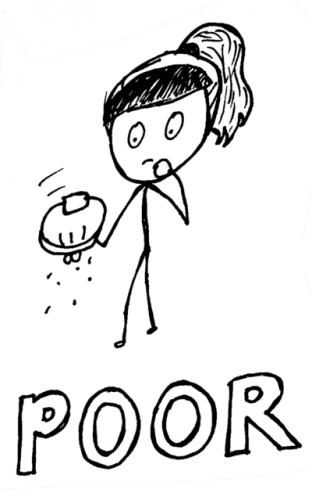
- Economically disadvantaged
I know, I know – it sounds really strange. But this term really is used to describe the demographic that many companies like to avoid.
- Underprivileged
This one really is quite strange. I mean, think about it: if “privileged” means “doing better than most people,” then being “underprivileged” should simply mean “not doing better than most people,” right?
Or in other words, “normal.” But it doesn’t. It just means “poor.”
- Low-income
This one is very common, especially in the business world.
It basically means the same as “economically disadvantaged,” or “underprivileged.”
We often use it with the words “families” or “households” when we’re speaking about demographics.
“There are a lot of low-income households in the west part of town. We should focus our marketing in the east.”
- Substandard housing; economically depressed neighbourhood
Speaking of low-income households, where are these people living? In poor neighbourhoods, right? But that just sounds too unpleasant, right? We don’t want to be reminded that there are poor people all over the place. So let’s rephrase them!
- Developing country
We can also extend euphemisms to talk about poor countries and societies. In the past we used to divide the world into first world countries, like the USA and France; second world countries such as Russia and Turkey (at the time); and third world countries– think of most of Africa. However, at some point in time, someone decided that the phrase third world was a little bit dismissive. So now we just have developed countries and developing countries.
But what about the ones in the middle? What happened to them? Good question. These days we call them emerging economies. Because money is everything.
Other ways to say “old”
Judging by the number of euphemisms we have for old people, we appear to be terrified of them.
We already have a common term, “elderly,” which we often use instead of “old.”
But there are more.

- Senior citizen / senior
I like this one. She’s not “old,” she’s just “senior” … and a “citizen” too! So we know that, because she’s senior, she knows best. So don’t mess with her!
We often just shorten this to “senior” and it’s more common in American English than British English.
- Pensioner
This one is very British. A pension is basically the money that the government gives you when you retire. So someone who receives it? That’s a pensioner. Makes sense, right?
- Retiree
…and so does this one. You’re retired?
Then you’re a retiree.
I guess the only thing about this phrase is that some people who are retired aren’t that old.
Maybe because they managed to invent something smart and could live off the profits of their new invention.
Or they were born rich and decided they didn’t really enjoy working.
Hooray for those people!
- OAP
This one’s falling a little out of fashion, but you’ll hear it from time to time. Can you guess what it stands for?
Yep! Old Age Pensioner.
- Pre-owned / pre-loved
OK. This actually means “second hand,” but it’s related to being old, so it goes here. I like the phrase “pre-loved” especially. I mean, I sometimes prefer getting things that are pre-loved.
Like books. Or pets.
Euphemisms for things happening at work
Sometimes bad things happen at work. But we still need to talk about it!
Euphemisms make it all easier…
Losing your job
This is a classic opportunity to use euphemisms.
Firing people and getting fired is an unfortunate part of life.
It’s unpleasant and has serious connotations for everyone concerned.
So why not make it sound … nicer … somehow?
THE PASSIVE ONES
A lot of these euphemisms are usually used in the passive.
The passive is often used to avoid responsibility, so this makes sense, right?
- Laid off
It means “fired,” of course! We can also use the noun, “lay-off,” when we want to talk about lots of people getting fired at the same time.
“There were 300 lay-offs at the Toyota factory after major restructuring.”
- Made redundant / involuntary redundancy
“Redundant” still isn’t a nice term.
This term is used when the company you work for no longer needs you because your job position has either disappeared, or you’ve been replaced by a computer – you have become “redundant,” like a member of a glam rock band.
We also have the charming euphemism “involuntary redundancy.” It means you didn’t want to lose your job, but you lost it anyway! To be fair, this often comes with a generous pay package.
My advice? Take that money, get a Harley and go motorcycling round India. Why not? What’s the worst that could happen?
- Forced into early retirement / forced retirement / involuntary retirement
Well, you can guess what this means, right?
You’re waiting for your retirement so you can get your full pension and use it to start that giraffe farm you’ve always dreamed of. You’re 65 years old and you’ve only got 5 years left!
Then you get called to the manager’s office.
Boom!
Forced retirement.
They don’t need you any more and you lose 5 years’ worth of pension. This can have a seriously negative impact on people.
I mean, how easy is it to get a new job when you’re 65 years old?
My guess is, “not that easy at all.”
- Your services are no longer required
Ouch! That’s got to hurt!
THE NON-PASSIVE ONES
- To let someone go
When I hear this euphemism, it always comes as a full sentence in my head.
“I’m sorry, but I’m afraid we’re just going to have to let you go.”
Then I think “Cool! But where to? Are they going to finally let me go to that beautifully designed office on the twelfth floor” … and I smile.
Then I realise that what they’re trying to tell me is that I’m fired. And I stop smiling.
- To dehire
Seriously! Who makes these euphemisms up? OK – you can understand what it means immediately. But doesn’t it sound silly?
- Out of work
Once you’ve been dehired (OK. Let’s just say “fired,” yeah?) – once you’ve been fired, you don’t have a job any more.
Most people would describe this as being “unemployed.” But some people prefer the term “out of work.”
“There are millions out of work at the moment, and he goes on holiday to Monaco? Honestly, I don’t understand politicians.”
- Between jobs
Another way of saying “out of work.”
- To downsize
OK, so you got laid off, or they let you go.
But let’s look at it from the company’s point of view.
Every now and again they decide that they want to get rid of some of their workers. They want to change the shape of the company to make it more “efficient.”
So they could just call this “firing lots of people.”
But they probably don’t. They probably use a word like “downsizing.”
- To restructure
Or they might go for “restructuring” instead. If they feel like being less honest … I mean more euphemistic.
- To rightsize
Yep. Losing lots of workers is sometimes called “rightsizing.”
Describing problems at work
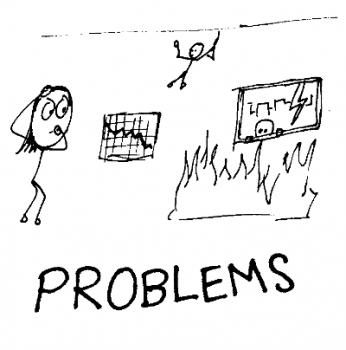
- Issue
The word “problem” is just too negative for some people.
They just prefer the word “issue.”
- Challenge
And for others, the word “issue” is still too unconstructive.
I mean, why make something negative when you can turn it into something positive?
Problems and issues are negative things.
But a challenge?
That’s something you can deal with!
- Concerned
If you say “I’m worried about this new financial trend,” you might cause panic. So say that you’re “concerned.”
Describing money
Some people behave as if saying words like “money” and “pay me, please” were the same as swearing. I personally like being direct when it comes to talking about money. But a lot of business environments like using “softer” terms.
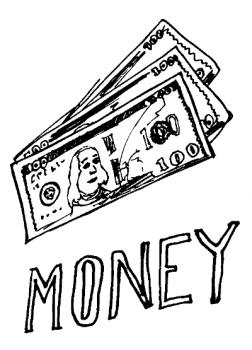
- Salary
OK. We all know this one.
It’s a softer term for “pay.”
- Compensation
But for some people, even the word “salary” makes them tremble with fear and run to the nearest exit.
They prefer the word “compensation.”
I find this one confusing.
I mean, doesn’t it imply that your job is a painful mistake and you need to be compensated for that?
- Compensation plan
Some people even go a step further and talk about your “compensation plan,” when they mean “your pay.”
- To have an outstanding payment
Instead of saying, “Hey! You owe us money!” you can say “Hello! You have an outstanding payment with us.” It doesn’t change the situation, but it might make them more likely to give you that money back.
Describing lying
Lying is such a terrible thing. But, is it? I guess it’s not so bad when you give it a different name, right?
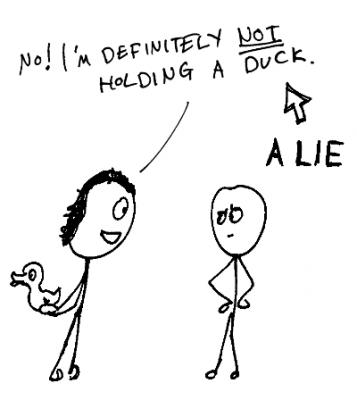
- Fabrication
“I’m sorry, but what I said was just a fabrication.”
Good euphemism, right?
It kind of sounds like you actually created something rather than said something that wasn’t true.
- Economical with the truth
I like this one a lot.
It can be particularly useful when you’re talking about someone lying and you don’t want to give them such a hard time.
“I think you were being a bit economical with the truth there, weren’t you?”
- To misspeak
I like this one a lot. It makes your lie sound like an accident. Very smart!
Politicians are particularly fond of this one.
OK. There we have it – euphemisms for the workplace.
Now you can say more without worrying about being too direct.
Good luck!
Gabriel Clark, LOS Consultant & Clark and Miller Co-founder
